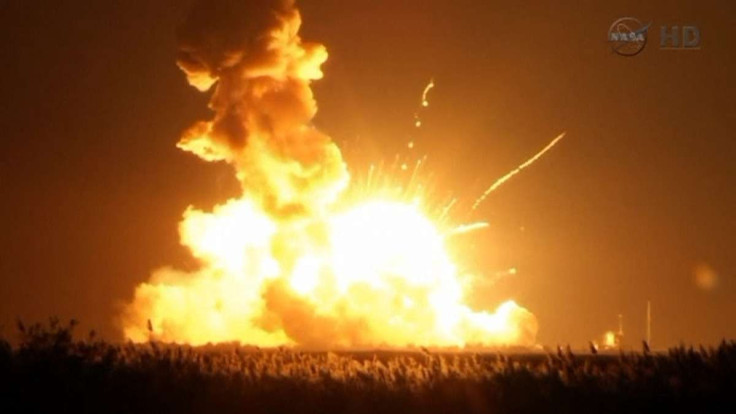Rocket Launch Explosion Update 2014: Turbo Pump In Refurbished Engine Likely Caused Antares Explosion

An investigation into last week’s explosion of an unmanned NASA-contracted rocket indicated the turbo pump in the rocket’s main engine was the root of the problem. The main engine of Orbital Sciences Corp.’s Antares rocket was a refurbished Soviet-era motor, which is now expected to be discontinued, Orbital Sciences Corp. CEO David Thompson said Wednesday.
The rocket, which was carrying a Cygnus cargo spacecraft, burst into flames seconds after liftoff from the Wallops Flight Facility in Virginia on Oct. 28. The explosion was referred to as “a catastrophic anomaly” on a live stream that NASA provided. The robotic spacecraft, which was loaded with 5,000 pounds of supplies for the International Space Station, was destroyed. No one was injured in the explosion, which NASA spokesman Jay Bolden described as a “failure to launch.”
Going forward, Orbital Sciences Corp. will reportedly purchase rockets from an unnamed external source to launch additional Cygnus cargo ships to fulfill its contract obligations with NASA. In the meantime, the company said it will advance its plans to integrate a new engine into its Antares rocket, NBC News reported Wednesday.
Consequently, the explosion leaves NASA with only one vehicle capable of delivering cargo to the International Space Station. Russia has offered to assist the United States with deliveries to the orbiting lab. NASA has said that the space station crew is not at risk of running out of supplies. There is enough food and water on the International Space Station to last people there for a year and another vehicle will reportedly be launched soon. “We will fly again as soon as we can safely and with confidence,” a NASA official said during last week’s press conference. “It’s a disappointment not to be able to deliver that cargo, but we will do so in the future.”
Just before the rocket launched last Tuesday, the space agency reported “100% favorable” weather and “no technical concerns with the rocket or spacecraft being worked,” according to a CNN report.
© Copyright IBTimes 2025. All rights reserved.





















